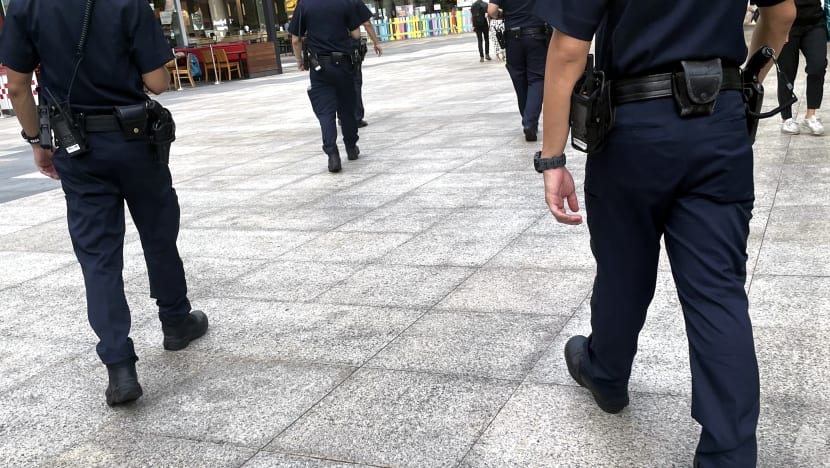Police to have more powers to apprehend people with mental disorders, after changes to law passed
The amendments are "scoped within a very specific circumstance of a psychiatric emergency and only where there is a patent risk of suicide", says an NMP who is a psychiatrist.


This audio is generated by an AI tool.
SINGAPORE: The police will have more powers to apprehend people with mental disorders who are deemed a safety risk to themselves or others, after amendments to the law were passed in parliament on Tuesday (Apr 2).
During an almost three-hour long debate, Members of Parliament (MPs) raised several concerns about the proposed changes in the Law Enforcement and Other Matters Bill, such as the stigma towards mental illness being further perpetuated as a result of the amendments.
However, Nominated MP Dr Syed Harun Alhabsyi, who is a psychiatrist and honorary secretary of the Singapore Psychiatric Association, noted that the Bill was "scoped within a very specific circumstance of a psychiatric emergency and only where there is a patent risk of suicide".
Dr Syed shared that he had personally dealt with psychiatric emergencies in his work.
“Where suicide risk assessment, even for psychiatrists, is not a perfect science, my view is that it is fair and appropriate for police officers to exercise reasonable judgement without waiting for a suicide to be imminently clear or after such attempt at lethal harm has been actualised,” he said.
MPs suggested further measures to strengthen the framework in handling cases involving those who are mentally unwell, including adequately training officers to deal with such situations and engaging mental health professionals in the process.
The Law Enforcement and Other Matters Bill gives some latitude for police officers to act with some urgency before a suicide attempt becomes imminent and before rescue could be more risky - both for the person who is under duress and for those who are trying to make a genuine attempt at rescue, said NMP Syed Harun Alhabsyi. Speaking in Parliament on Tuesday (Apr 2), he hopes the Government will look into three areas. Firstly, ensure that there is structured training for police officers in apprehending those who are attempting suicide. Secondly, ensure access to psychiatric evaluation and assessment without delay after the person has been apprehended. Thirdly, work more closely with mental health professionals in crisis work, such as having combined teams of law enforcement and mental health practitioners as collaborative first respondents.
WHAT ARE THE CHANGES TO THE LAW?
One change to the Mental Health (Care and Treatment) Act (MHCTA) allows police to apprehend those with mental health conditions who pose a danger to themselves or others, and take them for medical treatment.
Under the Act, police can apprehend such individuals, as opposed to arresting them, bringing them to seek help and not a lock-up.
The High Court had, in a previous ruling, determined that apprehensions are distinct from arrests under the Criminal Procedure Code, said Second Minister for Home Affairs Josephine Teo in parliament.
“This means that police officers do not have certain powers associated with arrest, which are essential when making apprehensions,” she said.
“In particular, the High Court determined that the police do not have powers of search and seizure to ensure that the person is not hiding dangerous weapons or items.”
This presents a problem as the police would be expected to hand over the person to the staff of the medical facility only after ensuring he or she was not in possession of weapons, said Mrs Teo.
Another change amends the Police Force Act to make clear that relevant powers, such as those of search and seizure, are available to the police when making apprehensions, whether under the MHCTA or any other Acts.
“This does not mean that the person will be needlessly roughed up. On the contrary, having assessed that the person may be suffering from mental health conditions, police officers are minded to carry out search and seizure with due care and respect,” noted Mrs Teo.
“Every SIM card in the hands of a scammer is a weapon,” said Second Minister for Home Affairs Josephine Teo in Parliament on Tuesday (Apr 2). She elaborated on how scammers have pivoted to using local SIM cards to reach prospective victims after being thwarted by measures such as blocking overseas calls that spoof local numbers and introducing the SMS Sender ID Registry. So, new offences are being introduced to target three groups of people who misuse local SIM cards to facilitate scams. The first group is irresponsible subscribers who give away their local SIM cards or provide their particulars to others to be used to sign up for local SIM cards. To address the challenge that the police face in proving knowledge or criminal intent, an irresponsible subscriber will be deemed liable in the following scenarios - they gave away their card for any gain, did not take reasonable steps to find out the identity and physical location of the recipient, or did not take reasonable steps to find out the recipient’s purpose for obtaining the card. The second group is middlemen involved in procuring or providing local SIM cards to scam syndicates. The police have also faced difficulties prosecuting such middlemen as it is hard to prove that they intended to abet an offence. A person who receives, supplies or possesses such local SIM cards may now be deemed liable without the prosecution having to prove knowledge or criminal intent if the cards were used for crime, or 11 or more cards were found in their possession. Criminal intent will also not have to be proven in cases of people buying, selling or renting a local SIM card registered with another person’s particulars. The third group is errant retailers, a small number of whom have used stolen or false credentials to register local SIM cards, which are then sold to scammers. There is currently no offence that specifically deals with such retailers and they might simply lose their contract with the mobile service provider. Making it a criminal offence will allow heavier punishment, including prison sentences, for employees involved in fraudulent registrations. The penalties for the new SIM card offences will be pegged to those for the misuse of Singpass credentials under the Computer Misuse Act. Changes to the law will also be made to allow the transmission of false messages for certain legitimate purposes, such as simulated phishing exercises to enhance awareness and vigilance against scams. Mrs Teo outlined other amendments being proposed. One is to allow the police to apprehend, not arrest, a person with a mental health condition who poses a danger to themselves or others, to take them for medical treatment - even if the timeframe of the danger is unspecified or not imminent. Another enables the police to not take further action for non-arrestable offences if the case is not serious or there are insufficient grounds to proceed.
CONCERNS RAISED
Dr Syed noted that when someone is on the brink of suicide and facing immense despair, the police and other Home Team officers remain their "last hope for rescue".
"Time is of the essence, and where reasonable grounds are sufficiently present to suggest a potential threat to self or others, my view is that apprehension may be necessary to save a life under such circumstances," he added.
The authorities need to ensure the individual gets access to psychiatric evaluation and assessment without delay after the apprehension, he added.
Dr Syed also called for police officers to undergo structured training in the apprehension of attempted suicide cases, coupled with input from care professionals and specialists in the field.
“Such structured training would also be important to ensure that while there is some latitude and range for judgement by police officers on the ground, the exercise of such powers of apprehension continues to be done with propriety, with confidence and with safety in mind,” he said.
His calls for training for frontline officers were echoed by MP Yeo Wan Ling (PAP-Pasir Ris-Punggol), who said such training to be made mandatory for "all enforcers", including full-time national servicemen. This should be conducted in a "timely and frequent manner", she added.
MP Edward Chia (PAP-Holland-Bukit Timah) noted that police officers, often the first responders to incidents involving individuals in mental health crises, could also be subject to a significant emotional toll.
Acknowledging the role of the Police Psychological Services Department, Mr Chia asked what more can be done for officers’ mental well-being.
“It is crucial to provide the police with comprehensive knowledge and training on how to handle individuals with mental health issues,” said NMP Razwana Begum Abdul Rahim.
“This includes understanding the signs of a mental health crisis, developing specialised responses and learning how to de-escalate situations effectively.”
Some MPs also called for the police to collaborate with mental health professionals when attending to such cases.
“While I recognise the importance of this measure in protecting the public, it is essential to consider the potential drawbacks. Police are not mental health professionals, and their interactions with individuals experiencing mental health crises can be complex and challenging,” Associate Professor Razwana said.
There are also concerns about an over-reliance on the police in cases of mental health crises, said MP Louis Ng (PAP-Nee Soon).
“One alternative that has been raised is that mental health professionals should lead the emergency response in such cases, where possible. This is already done in several cities,” he said.
He cited the example of the city of Eugene, Oregon, where crisis counsellors from a community programme receive hundreds of hours of training, and send responders to 3 per cent to 8 per cent of police cases.
What specific challenges have law enforcement officers faced in dealing with people with mental health conditions that warrant a lowering of the threshold for apprehension? MP He Ting Ru asked this question in Parliament on Tuesday (Apr 2). She raised several concerns. First, lowering the threshold from “reasonably imminent risk” to “reasonable likelihood that danger to life or personal safety may occur” would lead to different standards being applied to those with mental health conditions or illness, which would be discriminatory under United Nations guidelines. Second, whether any timeframes of “reasonable risk” would be applied and if so, what they are. Third, under what circumstances background checks for a history of mental disorder will be carried out and what records will be referred to. Fourth, what safeguards, guidelines or training will be available to police officers. Finally, what options are available to those who believe they were erroneously detained or subjected to excessive force or trauma. Ms He said she was worried about the amendments unnecessarily perpetuating stigma against people with mental health conditions. She also questioned if the police are best placed to respond to such situations. She noted that in recent years, many countries have taken steps to implement alternative strategies to provide support and de-escalate incidents. She suggested expanding the Crisis Response Team to respond not only to cases involving the risk of suicide but also to people experiencing mental health crises more generally. This could also help reduce the strain on the police, she said.
MP He Ting Ru (WP-Sengkang) also brought up overseas examples of professionals working with the police to handle such cases.
In 2017, Sweden introduced a psychiatric emergency response team, comprising an ambulance with two mental health nurses and one paramedic, to attend to mental health crises, she shared.
Another approach is the United Kingdom’s street triage model, a partnership between the police and approved mental health professionals to advise and support those experiencing mental health crises.
Noting that the Institute of Mental Health has partnered with the Singapore Police Force to pilot a Crisis Response Team to care for and support those with suicidal tendencies, Ms He asked if the initiative will be expanded even further.
MP Yip Hon Weng (PAP-Yio Chu Kang) said: “Clear guidelines are critical to prevent potential power abuses and ensure effective collaboration with mental health professionals.
“While traditional training methods have value, equipping police with real-world case studies, hands-on experience, and access to mental health experts is vital.”
The issue of stigma towards the topic of mental health was also a point of concern for MPs.
MP Wan Rizal Wan Zakariah (PAP-Jalan Besar) said that through his dialogues with mental health advocates, they had raised concerns and sought to understand the Bill better.
“There is an apprehension that, without careful implementation, these amendments could inadvertently contribute to the stigma surrounding mental health or lead to discrimination,” he said.
HOW DID MHA ADDRESS THESE ISSUES?
In her wrap-up speech, Mrs Teo responded to questions about whether the police should be accompanied by mental health professionals or community first responders when responding to cases that involve people with mental health conditions.
The minister said that, for such an arrangement to work, there would need to be sufficient numbers of such professionals on standby round-the-clock, and for them to be able to respond immediately with police to all cases across the country.
In Parliament on Tuesday (Apr 2), Second Minister for Home Affairs Josephine Teo responded to clarifications sought by Members of the House on the Law Enforcement and Other Matters Bill. The Bill was then passed.
“Unfortunately, I think this will be very difficult to accomplish,” she said.
“The practical approach is for the police, after dealing with the danger, to refer such persons to mental health professionals for treatment.”
Training for the police is regularly updated and conducted by qualified professionals, she added. For example, officers undergo a mental health awareness course designed by the Agency for Integrated Care, which helps the officers identify and respond to people observed with indications of mental health conditions.
Mrs Teo also confirmed that IMH and the police are already reviewing the suggestion to expand the Crisis Response Team.
She agreed with Dr Syed that risk assessment is "not a perfect science".
“It is not practicable to be too prescriptive. Doing so could bind the police officers’ hands or prevent them from acting quickly when they should," said Mrs Teo, who is also Minister for Communications and Information.
"Situations on the ground can be dynamic, and they need to be given the latitude to make quick decisions in difficult situations.
"The safety of the public and family members around such a person, and of the person himself, should be a priority."
She added that the Ministry of Home Affairs (MHA) and the police do not condone officers abusing their powers or acting inappropriately. Police ground response force officers wear cameras which ensure accountability and transparency.
On the question of resourcing, MHA does not expect a significant increase in the number of referrals as a result of the amendments, because the threshold is "still quite high", the minister said.
"It’s not a case where suddenly you’re going to go out to make apprehensions. So there is no anticipated increase in resourcing needs.
“The police intervene only when the person poses a danger to himself and others around him. The police do not get involved in cases involving persons with mental health conditions but who do not pose any danger to himself or others."
She also addressed concerns about social stigma that mental health patients may face.
"We are actively working towards destigmatising mental health conditions, so that people do not hesitate to seek help," said Mrs Teo.
"Please be assured that the police do not seek to put more burden on such persons or their families."
















